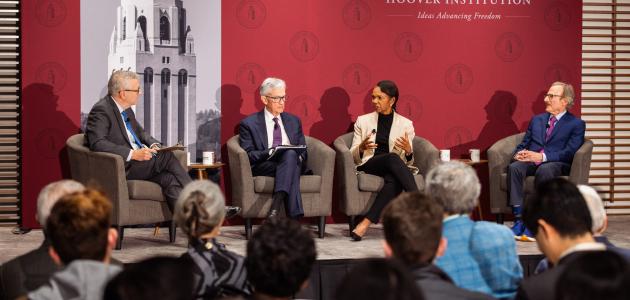A weekly digest of the latest news and research related to the work of the Technology, Economics, and Governance Working Group. Topics covered in the digest include cybersecurity, domestic regulation, innovation, international competition, social media disinformation, and the California exodus.
This week’s edition features President Biden’s trip to Asia, the fallout from President Xi’s stringent lockdown policies in China, what Russia’s military failures in Ukraine indicate about future force structure requirements, US special operators’ vision for autonomy on the battlefield, and cybersecurity risks to American businesses. Additionally, some Democrats rethink tech legislation before the midterm election, Republicans block the Domestic Terrorism Prevention Act, and a CA bill allows citizens to sue sellers of ghost guns.
Industrial Policy, International Competition, and Cooperation
Biden’s Asia Trip Shows Challenges in Uniting Region | The Wall Street Journal
This week, President Biden concluded his first trip to Asia to strengthen US alliances in the region. On Monday, he remarked to Japanese officials that the US would take military action in response to a Chinese invasion of Taiwan. Although the White House stated that this does not represent a change in US policy, the head of the foreign affairs committee in Japan’s ruling party said that Biden’s commitment will motivate Tokyo to expand its military and diplomatic influence. Biden’s visit also exposed some key policy disagreements between the US and its Asian partners. The unveiling of the Indo-Pacific Economic Framework was met with skepticism from developing nations, which were disappointed that the platform would not guarantee expanded access to American markets. Finally, the Quadrilateral Security Dialogue released a vague statement about the war in Ukraine that did not criticize Russian aggression, likely due to India’s close ties to Moscow.
Foreign investors are fleeing China | The Economist
Lengthy lockdowns in Shanghai have exacerbated China’s property crisis and sparked fears among investors that Beijing’s economic policies are more ideological than pragmatic. Worries that the current leadership is prioritizing zero-covid over long-term growth have worsened the foreign sell-off of Chinese stocks and bonds that has persisted for months. Some experts have attributed President Xi’s stringent policies and his recent crackdown on domestic tech groups to preparations for the Communist Party Congress in the fall, where he is expected to receive a term renewal.
War Will Never Be This Bulky Again | The Atlantic
While the internal failures of Russia’s military apparatus have received most of the blame for Moscow’s botched invasion of Ukraine, Russia’s difficulties may mark a universal tactical shift in warfare that favors cheaper, more agile defensive firepower over heavy equipment and vehicles. During World War II, heavy tanks, aircraft carriers, and fixed-wing aircraft were unmatched in their lethality, but modern advancements in mobile weaponry have begun to outpace the defensive capabilities of expensive, heavily armored vehicles. Military leaders should view Russia’s failures as a warning that significant preparations are needed to effectively engage in the new battlefield environment.
Domestic Regulation
In private, vulnerable Senate Dems back off tech bill | Politico
The American Innovation and Choice Online Act (AICO), a bipartisan bill that would prohibit large tech firms from favoring their products over their competitors, is now facing some resistance from Senate Democrats, sources say. These lawmakers fear that pushing the bill to a vote before midterm elections would reduce efforts spent on core issues, potentially compromising the party’s majority. Lobbyists have warned that the bill would hurt consumer interests by damaging popular services like Google Docs and Amazon Prime. While supporters of the bill dismiss these concerns, critics say that voting on controversial antitrust legislation could hurt their prospects for reelection and that the co-sponsors were not receptive to revising the bill to address their concerns.
Innovation
‘Collaborative, Portable Autonomy’ Is the Future of AI for Special Operations | Defense One
US special operators have indicated that they are working towards developing an integrated communication network of automated sensors and systems that will seamlessly share information in a process called “collaborative autonomy.” They also hope to standardize the underlying autonomy software across all potential platforms to facilitate adaptability. Greater reliance on automated technologies would also allow operators to “untether” themselves from radio to conceal their location. Notably, the tech companies developing these capabilities expect policy and ethics questions of deploying collaborative autonomy will present a greater challenge than the technology itself.
Cyber
Disclosure of Software Supply Chain Risks | RAND Corporation
Critical business services’ increased reliance on software applications comes at the cost of increased cyber risks. As these software supply chain ecosystems become more decentralized through the integration of open-source and third-party products, firms are decoupled from the oversight of their own cyberinfrastructure. Despite growing recognition of this issue, existing rules do little to address the underlying risks. The authors recommend the SEC introduce tighter regulations that would obligate companies to disclose their approach to software supply chain security in greater detail.
America’s small businesses aren’t ready for a cyberattack | CNBC
According to a recent survey, cybersecurity remains the lowest priority concern for small business owners, even as experts warn of increased risks of cyberattacks after Russia’s invasion of Ukraine. Only 5% of small business owners viewed cybersecurity as the greatest risk to their business, while 38% reported that inflation was their biggest concern, up from 31% last quarter. Most small businesses have not taken basic precautions against cyberattacks, such as installing antivirus software and creating backups. In contrast, consumers’ views on cyber are more grave—75% of Americans expect businesses to be hit by a major attack in the next year.
State & Local
Silicon Valley’s Prosperous Existence Is the Surest Sign of the Fed’s Unctuous Irrelevance | Forbes
Silicon Valley startups have experienced rising layoffs, which bodes poorly for venture capital enthusiasm this summer. These trends threaten to ripple throughout the country and the global market. Forbes contributor John Tamny argues that the Federal Reserve should not intervene to attempt to staunch funding outflows by lowering interest rates because the natural forces of the market would counteract artificially cheaper credit.
Just after Texas shooting, California Senate passes Texas-style bill targeting assault weapons, ghost guns | The San Francisco Chronicle
On Tuesday, the California Senate passed a bill allowing citizens to sue sellers of untraceable ghost guns and illegal assault weapons for at least $10,000. The legislation was modeled after a Texas abortion law upheld by the Supreme Court that allows Texans to sue anyone who performs an abortion after the start of cardiac activity. Ghost guns—user-assembled weapons without serial numbers or background checks—are difficult for law enforcement to track and have been used in an increasing number of fatal shootings in the Bay Area.
Freedom of Speech, Domestic Democracy, and Extremism
Senate Republicans block domestic terrorism bill | The Hill
Senate Republicans blocked the Domestic Terrorism Prevention Act, a bill introduced by Majority Leader Charles Schumer that would create an interagency task force within the Department of Justice, Department of Homeland Security, and the FBI to investigate extremist infiltration of the military and federal law enforcement. Republican lawmakers who opposed the bill argued that domestic terrorism is prosecuted effectively under existing laws and that the proposed legislation could create a partisan double standard for classifying political groups as extremists.














